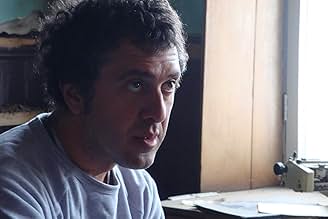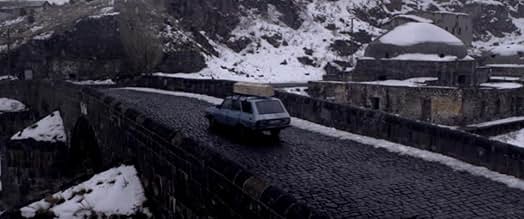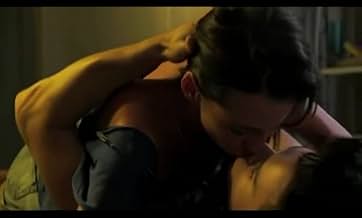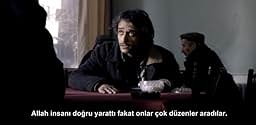Kosmos
- 2009
- 2h 2min
Añade un argumento en tu idiomaA strange man with otherworldly talents becomes both a friend and a pariah in a small Turkish town in this drama from writer and director Reha Erdem. Yahya is nearly in a panic when his youn... Leer todoA strange man with otherworldly talents becomes both a friend and a pariah in a small Turkish town in this drama from writer and director Reha Erdem. Yahya is nearly in a panic when his young son falls into the river on a wintry day and looks lifeless when he's pulled from the wa... Leer todoA strange man with otherworldly talents becomes both a friend and a pariah in a small Turkish town in this drama from writer and director Reha Erdem. Yahya is nearly in a panic when his young son falls into the river on a wintry day and looks lifeless when he's pulled from the water.
- Premios
- 16 premios y 10 nominaciones en total
Argumento
¿Sabías que...?
- CuriosidadesTürkü Turan's debut.
- Banda sonoraStumble Then Rise On Some Awkward Morning
Performed by Thee Silver Mt Zion (as A Silver Mt. Zion)
Constellation Records & Rough Trade Publishing Ltd
The film opens with inhuman howling winds whirling round and round over a white wintry snows-cape, and on its rounds the wind returns (Eccles 1.6), snowing the whole world over, shifting to night, with its hoary silver-gray sky menacing a vacant snows-cape, shifting to day again, a pure argent white snows-cape undisturbed and unperturbed by a background speck of movement, a lone feral-like man running breathlessly, at full speed towards white nothingness, wailing at whatever he's left behind - a vast boundless vacant snows-cape of white nothingness. But then the run ends at the snowed-over cliff, and he takes in the view, right out of an impressionistic painting: the outline of a snow-swept medieval town sculptured by the blizzard and hewed right out of the rocks of the valley, domes and spires of trees and serpentine roads completing the vista. The wind echoes, the sound of emptiness reverberates across all the corners of the earth, synclastically returning to this medieval town, hallowed out of the stones of the earth.
The man, among rocks, a whirling wine dark river tessellating impartially alongside him as he takes a knotted mess of money out his shoe. Catacoustical, tintinnabulation sounds of nature and mechanical melt into each other: fermenting water and crunching snow and echoing rocks spectral intersecting with distant sounds of machinery and battle. A young girl, howling a wail, and the man, abandoning his wealth to the rocks, runs responds to the call: he runs into the ferocious slate ice waves to save a child drifting unconscious in the water. Breathing the child back into life, he then collapses, his winded breathing the sound of a wounded animal.
Cross-cut of the moon: representing the cyclical movement of day and night, the moon (and sun) is prime evidence in nature of the repetitive cyclical character of reality (Ecclesiastes), a notion that is a radical challenge to the conception of time and sequence inscribed in Genesis and elsewhere in the Bible, where things are imagined to progress meaningfully towards fulfillment. Trademark of Reha Erdem: the moon, a stationary indifferent dazzlingly bright spherical ornament, obnubilated and obtenebrated by pillars of clouds and the impenetrable murky blackness of night. Then we hear a cow's heated, guttural mooing, moans from the bowels of the earth, and brightly-lit circular clocks whose hands are stuck, stuttering, no forward motion, and looks almost as if the hands are trying to move counterclockwise.
Battal, a prophet, a wild, feral man with a wondrously mellifluous voice flowing with honey, trilling ululations like a wolverine, his veriloquence enrapturing the townspeople just as Ecclesiastes has enraptured listeners and readers for over fifteen-hundred years. Most of his dialogue straight out of Ecclesiastes, a few bits come from the Book of Job and Song Of Songs. I must segue into Ecclesiastes for a moment, before returning to the film.
Howling wolves and cawing birds and whirling water and tintinnabulations of bullet spray ricochet against a ululating Battal chasing the girl, the masculine and feminine are primitive and hymnal and delightful and sensual and fierce and stimulating as the sun and the moon and the river.
Pieces of music by A Silver Mt. Zion rake through certain scenes like sunlight (or G-d's light...), the music a golden threnody of weltschmerz, the musicality evincing the sadness over the evils of the world that encapsulates the sum total of the mood of the film and the director's mindset as he was composing this cinematic masterwork.
A wanderer, hero, a prophet, a wild animal, a mute, a bully, what next? Astral sounds jettison and we see thin cow legs deep in the snow, heated gutturals reminding us of slaughter, and like lighting, a visual of short wave sci-fi sound: circuitously tinseling the tenebrous blackness of night, Saturn's Rings, meteor trails, a time-exposure of millions of car lights streaking by fast in the black of night, spiraling galaxies, and then a plain, a deserted lunar plain ontologically blanked by the consuming expanse of an impenetrable black sky, catch your breath as a city of the plain, formed of fallen stars, shimmers and twinkles across the horizon, a radiating band of light trumping the ineluctably of dark.....
And this is just the beginning.
Battal preaches to any and all, chases after three women, performs miracles, self-heals his cigarette burn, spirits out the infernal cough of an ailing old tailor, pleasures the teacher out of her migraines, guilts the boy who stole money from him into speaking again after being mute for a year), steals money to pay for sustenance but also gives the stolen money to others in need, howls like an animal in pursuit of Neptune, scales trees and roars ferociously and religiously peregrinates through the squalid, run down streets of the town where rabid dogs prowl and where buildings are vacant empty shells. Battal, wanderer, foreigner, hero, radical prophet, thief, wild animal, lover, healer, hedonistic, generous.
Kosmos (2010) laments the lack of faith that afflicts our modern world and the contemporary human, the lack of faith in existence, nature, humankind, the interconnectedness of the world.
Battal's dialogue is directly lifted from, in film order, Ecclesiastes 9:2-9:5, Ecclesiastes 3:16-3:20, Ecclesiastes 2:20-2:26, Song Of Songs (Solomon) 4:13-4:15, Song Of Songs (Solomon) 6:10, Ecclesiastes 11:2- 11:3, Ecclesiastes 7:29, Ecclesiastes 4:9-4:10, Ecclesiastes 4:11, Ecclesiastes 5:2, Job 15:14, Job 22:14
- TemporaryOne-1
- 19 feb 2017
- Enlace permanente
Selecciones populares
- How long is Kosmos?Con tecnología de Alexa
Detalles
Taquilla
- Recaudación en todo el mundo
- 79.914 US$
- Duración2 horas 2 minutos
- Color
- Mezcla de sonido
- Relación de aspecto
- 2.35 : 1
Contribuir a esta página










